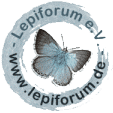Version 4 / 5 vom 22. Mai 2024 um 15:41:01 von Jürgen Rodeland
Länder:

 +1Kontinente:SA
+1Kontinente:SA


 +1Kontinente:SA
+1Kontinente:SAInhalt
2. Diagnose
2.1. Männchen
1-3: ♂, Daten siehe Etiketten (coll., det. & fot.: Ernst Brockmann, Fotos bearbeitet: Michel Kettner)
4-6: ♂, Daten siehe Etiketten (coll., det. & fot.: Ernst Brockmann, Fotos bearbeitet: Michel Kettner)
7-9: Lectotypus ♂, Daten siehe Etiketten (fot.: Nick V. Grishin, Fotos bearbeitet: Michel Kettner), © Images copyright Trustees Natural History Museum, used with permission.
2.2. Weibchen
1-3: ♀, Daten siehe Etiketten (fot.: Ernst Brockmann, Fotos bearbeitet: Michel Kettner), coll. Departamento de Zoologia, Universidade Federal do Paraná, Curitiba, Paraná, Brazil.
4-6: ♀, Daten siehe Etiketten (coll., det. & fot.: Ernst Brockmann, Fotos bearbeitet: Michel Kettner)
2.3. Erstbeschreibung
3. Weitere Informationen
3.1. Andere Kombinationen
- Pyrrhopyga [sic] antias Felder & Felder, 1859 [Originalkombination]
- Sarbia antias (Felder & Felder, 1859)
3.2. Faunistik
Nach Mielke, Brockmann & Mielke (2022) kommt die Art in Brasilien vor.
Locus typicus: Brasilien.
(Autor: Michel Kettner)
3.3. Literatur
- Brockmann E., Mielke, C. G. C. & O. H. H. Mielke (2022): Hesperiidae III: New World Pyrrhopyginae, short text and plates. — In: E. Bauer & T. Frankenbach (ed.) (2022): Butterflies of the World 50: 40 p. + 76 pl. Keltern.
- Erstbeschreibung: Felder, C. & R. Felder (1859): Lepidopterologische Fragmente. IV. — Wiener Entomologische Monatschrift 3 (12): 390-405, pl. VII-IX.
- Mielke, O. H. H., Brockmann, E. & C. G. C. Mielke (2022): Hesperiidae II: New World Pyrrhopyginae, detailed text. — In: E. Bauer & T. Frankenbach (ed.) (2022): Butterflies of the World 49: 120 pp. Keltern.
- Orellana A. (2008): Pyrrhopyginae de Venezuela (Lepidoptera: Hesperioidea: Hesperiidae). — Entomotropica 23 (3): 177-291. [PDF auf saber.ucv.ve]
3.4. Informationen auf anderen Websites (externe Links)
- [BOLD], dort unter Sarbia antias zu finden.
- [Global Biodiversity Information Facility], dort unter Sarbia antias zu finden.




















